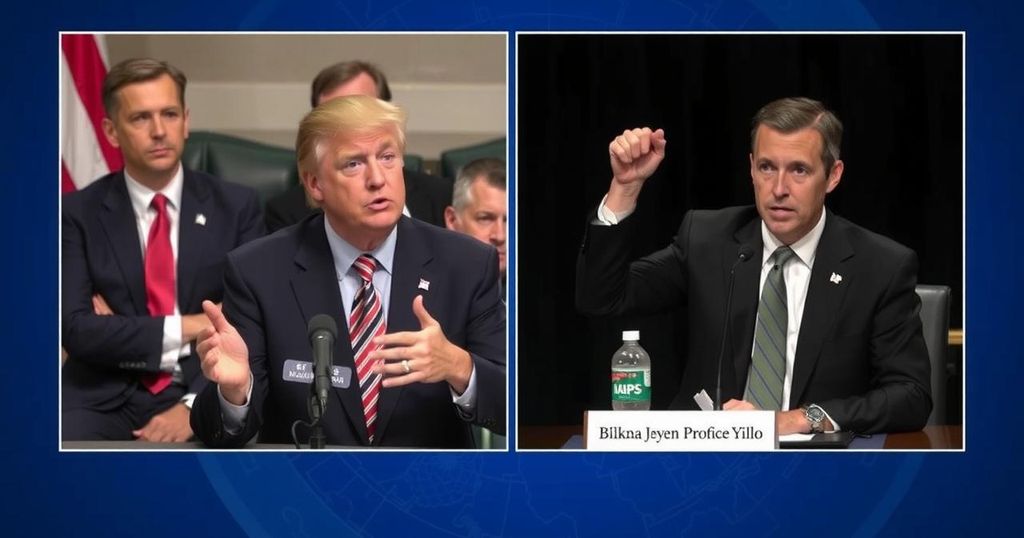US Confirms Direct Contact with Syrian Rebel Group Hayat Tahrir al-Sham

The United States has acknowledged direct contact with the Syrian rebel group Hayat Tahrir al-Sham amidst ongoing diplomatic efforts following President Bashar al-Assad’s regime collapse. Secretary Antony Blinken emphasized principles for a new Syrian government, stress on locating missing journalist Austin Tice, and the importance of preventing ISIS from regaining strength, while addressing Iranian influence and Israeli military actions.
The United States has confirmed direct engagement with Hayat Tahrir al-Sham (HTS), a Syrian rebel group currently asserting control in the country, as articulated by Secretary of State Antony Blinken on Saturday. This revelation marks the first official acknowledgment of such interactions, which occurred during Blinken’s diplomatic mission following the unexpected fall of President Bashar al-Assad’s administration. In a press conference held in Aqaba, Jordan, Blinken stated the significance of contact with HTS among other groups, emphasizing the legal permissibility of dialogues with entities designated as terrorist organizations.
Blinken highlighted the urgent goal of locating Austin Tice, an American journalist missing in Syria since 2012, while reiterating core principles for a prospective Syrian government, including the necessity for respecting the rights of Syrian citizens, maintaining regional stability, ensuring humanitarian assistance, and securing any existing chemical weapons. These guidelines, formulated after the regime’s collapse, received unanimous support during a collaborative meeting with various nations in Aqaba.
Prior to the ministerial assembly, Blinken conferred with representatives from Jordan, Turkey, and Iraq to mobilize collective agreement regarding these principles. He underscored that the United States and its allies are committed to facilitating a new direction for the Syrian populace, accentuating the broader implications of developments in Syria, which could extend beyond its borders.
In light of ongoing conflicts in Northern Syria, particularly between Turkish-backed forces and the US-supported Syrian Democratic Forces (SDF), Blinken cautioned that ISIS may exploit this transitional phase. He affirmed the critical role of the SDF in combating ISIS, urging all involved parties to prevent diversions that might impede anti-ISIS operations.
During meetings held in Ankara and Baghdad, Blinken also articulated concerns regarding Iranian influence in the region, seeking cooperation from Iraqi leaders to mitigate the activities of Iran-aligned militias. Moreover, he navigated discussions concerning Israel’s military actions in Syria, which have drawn criticism from various Middle Eastern states, yet have not been explicitly condemned by the US government. Blinken mentioned ongoing dialogues with Israel regarding their operations, which aim to restrict military equipment from reaching extremist groups.
As the US administration transitions, the implications of current policies and international relations may shift, leading to evolving strategies in response to developments within Syria and the wider region.
The Syrian conflict has been an ongoing crisis since 2011, involving multiple factions, foreign powers, and complex political dynamics. President Bashar al-Assad’s regime has faced significant challenges, including various armed groups vying for control of territory. The emergence of groups such as HTS and the SDF reflects the fragmentation within Syrian opposition and the growing influence of external actors, including the US and its allies. The recent changes in power dynamics following Assad’s governmental collapse have prompted renewed diplomatic efforts by the US to shape a peaceful outcome while countering threats such as ISIS and addressing humanitarian needs.
In summary, the United States’ confirmation of direct contact with the Syrian rebel group HTS reflects a significant shift in diplomatic engagement amidst the evolving conflict in Syria. With an emphasis on securing humanitarian efforts, respecting human rights, and countering terrorism, Secretary Blinken’s statements delineate the US’s strategic approach in navigating the complexities of the region. Continued dialogue with various stakeholders, including addressing the actions of Israel and Iranian militias, showcases the multifaceted challenges that lie ahead as Syria embarks on a critical transitional period.
Original Source: www.cnn.com








